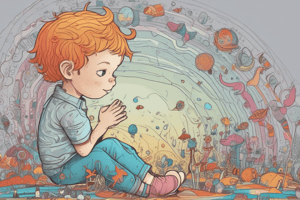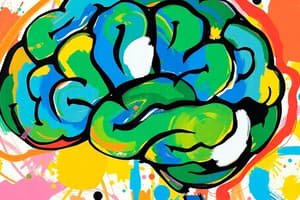Podcast
Questions and Answers
At what age does an infant typically develop the gross motor skill of lifting their head while on their stomach?
At what age does an infant typically develop the gross motor skill of lifting their head while on their stomach?
- 4-6 months
- 1-2 months (correct)
- 1-2 weeks
- 7-9 months
Fine motor skills develop in late childhood.
Fine motor skills develop in late childhood.
False (B)
What is the term for using one-word sentences to communicate?
What is the term for using one-word sentences to communicate?
Holophrastic Stage
During the _______________________ stage of language development, infants make sounds to communicate.
During the _______________________ stage of language development, infants make sounds to communicate.
Match the gross motor skills with the approximate age range:
Match the gross motor skills with the approximate age range:
What is the approximate age range for the Telegraphic Speech stage in language development?
What is the approximate age range for the Telegraphic Speech stage in language development?
According to Piaget's Cognitive Theory, children in the Preoperational Stage (2-7 years) use logic and problem-solving skills to understand the world.
According to Piaget's Cognitive Theory, children in the Preoperational Stage (2-7 years) use logic and problem-solving skills to understand the world.
What is the term for understanding that objects still exist even when out of sight, which is a cognitive development milestone around 6-9 months?
What is the term for understanding that objects still exist even when out of sight, which is a cognitive development milestone around 6-9 months?
In the context of Social Emotional Development, a child's ability to cooperate with others is typically observed around _______ years of age.
In the context of Social Emotional Development, a child's ability to cooperate with others is typically observed around _______ years of age.
Match the following child psychology theories with their primary focus:
Match the following child psychology theories with their primary focus:
Flashcards are hidden until you start studying
Study Notes
Motor Skills Development
- Gross Motor Skills:
- Develops in infancy and early childhood (0-3 years)
- Includes large muscle movements, such as:
- Lifting head while on stomach (1-2 months)
- Rolling over (2-4 months)
- Sitting up (4-7 months)
- Crawling (6-10 months)
- Walking (10-14 months)
- Fine Motor Skills:
- Develops in early childhood (1-5 years)
- Includes small muscle movements, such as:
- Grasping and releasing objects (4-6 months)
- Transferring objects from one hand to another (6-8 months)
- Using raking and grasping motions to pick up small objects (8-10 months)
- Drawing and using utensils (1-2 years)
Language Acquisition
- Stages of Language Development:
- Cooing and Babbling (0-6 months): making sounds to communicate
- Babbling with Consonants (6-9 months): adding consonants to vocalizations
- ** Gesturing and Pointing** (9-12 months): using gestures to communicate
- Holophrastic Stage (12-18 months): using one-word sentences
- Telegraphic Speech (18-24 months): using short sentences with key words
- Language Development Milestones:
- Saying first word (around 12 months)
- Combining two words (around 18 months)
- Using around 50 words (around 24 months)
- Using simple sentences (around 36 months)
Cognitive Development
- Sensory-Motor Stage (0-2 years): learning through sensory experiences and motor activities
- Preoperational Stage (2-7 years): using symbols and language to represent the world
- Concrete Operational Stage (7-11 years): using logic and problem-solving skills
- Formal Operational Stage (11-15 years): using abstract thinking and reasoning
- Cognitive Development Milestones:
- Object permanence (around 6-9 months): understanding that objects still exist even when out of sight
- Imitation (around 12-18 months): imitating actions and behaviors
- Problem-solving (around 2-3 years): using trial and error to solve problems
Social Emotional Development
- Attachment Theory:
- Secure attachment: warm, responsive, and consistent caregiving
- Insecure attachment: inconsistent, neglectful, or abusive caregiving
- Social Emotional Development Milestones:
- Smiling and laughing (around 2-3 months)
- Showing stranger anxiety (around 6-9 months)
- Playing alongside others (around 12-18 months)
- Cooperating with others (around 2-3 years)
- Developing empathy and understanding of others' emotions (around 3-5 years)
Child Psychology
- Theories of Child Development:
- Psychoanalytic Theory (Freud): focus on unconscious motivations and early childhood experiences
- Behavioral Theory (Watson and Skinner): focus on environmental influences and learning
- Cognitive Theory (Piaget): focus on active learning and construction of knowledge
- Social Learning Theory (Bandura): focus on observation and imitation of others
- Child Psychology Applications:
- Parent-child relationships and attachment
- Child development and education
- Child mental health and therapy
- Child welfare and policy
Motor Skills Development
- Gross Motor Skills:
- Develops in infancy and early childhood (0-3 years)
- Includes large muscle movements, such as:
- Lifting head while on stomach (1-2 months)
- Rolling over (2-4 months)
- Sitting up (4-7 months)
- Crawling (6-10 months)
- Walking (10-14 months)
- Fine Motor Skills:
- Develops in early childhood (1-5 years)
- Includes small muscle movements, such as:
- Grasping and releasing objects (4-6 months)
- Transferring objects from one hand to another (6-8 months)
- Using raking and grasping motions to pick up small objects (8-10 months)
- Drawing and using utensils (1-2 years)
Language Acquisition
- Stages of Language Development: - Cooing and Babbling (0-6 months) - Babbling with Consonants (6-9 months) - Gesturing and Pointing (9-12 months) - Holophrastic Stage (12-18 months) - Telegraphic Speech (18-24 months)
- Language Development Milestones:
- Saying first word (around 12 months)
- Combining two words (around 18 months)
- Using around 50 words (around 24 months)
- Using simple sentences (around 36 months)
Cognitive Development
- Stages of Cognitive Development:
- Sensory-Motor Stage (0-2 years)
- Preoperational Stage (2-7 years)
- Concrete Operational Stage (7-11 years)
- Formal Operational Stage (11-15 years)
- Cognitive Development Milestones:
- Object permanence (around 6-9 months)
- Imitation (around 12-18 months)
- Problem-solving (around 2-3 years)
Social Emotional Development
- Attachment Theory:
- Secure attachment: warm, responsive, and consistent caregiving
- Insecure attachment: inconsistent, neglectful, or abusive caregiving
- Social Emotional Development Milestones:
- Smiling and laughing (around 2-3 months)
- Showing stranger anxiety (around 6-9 months)
- Playing alongside others (around 12-18 months)
- Cooperating with others (around 2-3 years)
- Developing empathy and understanding of others' emotions (around 3-5 years)
Child Psychology
- Theories of Child Development:
- Psychoanalytic Theory: focus on unconscious motivations and early childhood experiences
- Behavioral Theory: focus on environmental influences and learning
- Cognitive Theory: focus on active learning and construction of knowledge
- Social Learning Theory: focus on observation and imitation of others
- Child Psychology Applications:
- Parent-child relationships and attachment
- Child development and education
- Child mental health and therapy
- Child welfare and policy
Studying That Suits You
Use AI to generate personalized quizzes and flashcards to suit your learning preferences.





